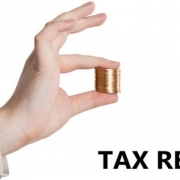Will You Owe Taxes On Your 2020 Unemployment Checks?
 Extended unemployment benefits provided much-needed relief to 40 million people in 2020, according to Century Foundation statistics.
Extended unemployment benefits provided much-needed relief to 40 million people in 2020, according to Century Foundation statistics.
But now those Americans could be facing hefty tax bills this April if they didn’t realize that unemployment benefits are taxable by the federal government and also by some states.
People who received unemployment in 2020 will receive a Form 1099-G, Certain Government Benefits, that shows the amount received during the year, according to the IRS. You’ll need to report this amount on your Form 1040 when you file your taxes this year. Because of the added benefits as part of coronavirus relief, your unemployment income could change your tax bracket from what you expected, so review your tax paperwork carefully to determine what percentage of your adjusted gross income you’ll need to pay.
It’s important to note that both state unemployment insurance and additional unemployment compensation through the CARES Act are taxed, CNBC writes.
In addition to owing taxes on unemployment, you could owe the IRS a “Penalty for Underpayment of Estimated Tax” if you haven’t paid most of your taxes owed for the year before April 15. The IRS says this penalty will be waived if you:
- Owe less than $1,000 after subtracting withholding and deductible credits
- Paid 90% of the current year’s taxes by April 15 or
- Paid an amount equal to 100% of the prior year’s taxes by the deadline
Ways to Reduce the Taxes You Owe This Year
If you’re facing an unexpected tax bill this April, don’t panic. You may qualify for an earned income tax credit worth up to $6,600 for a household with three or more children that qualifies as low-income, and a child tax credit worth up to $1,400 per qualifying child, CNBC reports. These credits can help reduce your tax bill.
Normally, you wouldn’t be able to use the earned income credit to reduce taxable unemployment insurance, since unemployment benefits are not considered earned income by the IRS. But this year, as part of the Taxpayer Certainty and Disaster Tax Relief Act of 2020, you can use your earned income amount from 2019 to calculate your EITC for 2020. If you were employed, running a business or working as a 1099 contractor in 2019 but filed for unemployment in 2020, your earned income from 2019 may help reduce your 2020 tax bill through the EITC.
Since tax returns may be more complicated this year, consider speaking to a tax professional who understands the tax law and can review all your deductible expenses to help reduce your tax liability.
File Early
If your employment situation changed dramatically during the pandemic, consider filing your taxes as early as possible so you can be prepared for the possibility of a bill. No matter when you file, your taxes aren’t due until April 15. Filing early will help you get a clear picture of your finances and figure out how you might pay the taxes owed to avoid penalties.
If you determine you can’t come up with the money, the IRS may be able to grant you a short-term extension, an installment agreement or an offer-in-compromise. You can negotiate these terms yourself by calling the IRS at 800-829-1040 or enlisting the help of a tax professional to help you through the process.
Planning for Next Year
Unemployment recipients can elect to have federal income tax withheld from unemployment, but many people didn’t realize this last year. If you’re still collecting unemployment, you can file Form W-4V to withhold 10% of your benefits and reduce your tax bill for your 2021 taxes. Alternatively, you can file quarterly tax payments to minimize your tax bill.
Those who withheld taxes in 2020 may find themselves in better shape come April, although many people needed every dollar of their unemployment checks to survive. As a last resort, some Americans may plan to use the anticipated third stimulus checks to pay their tax bill this year.
Source: GoBankingRates


